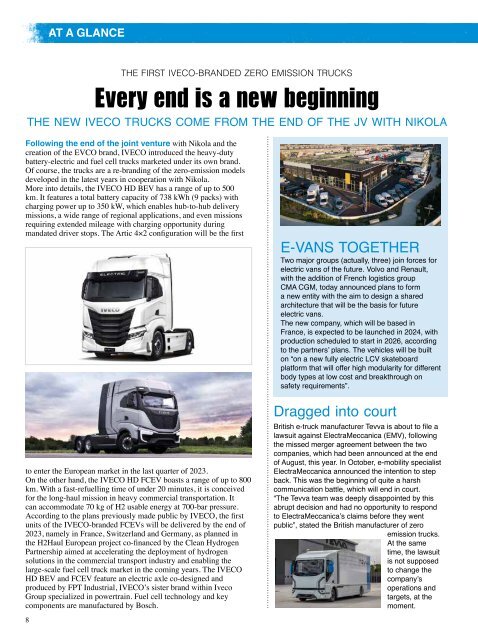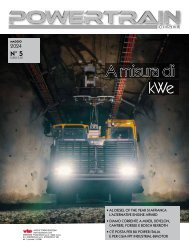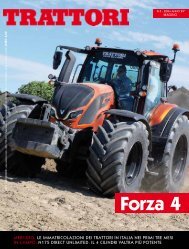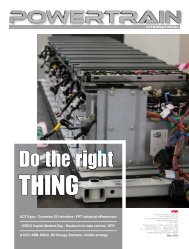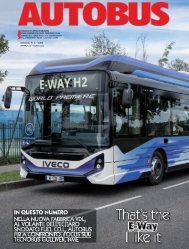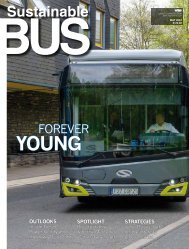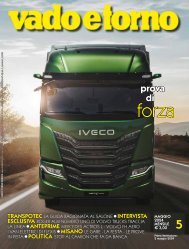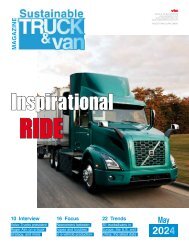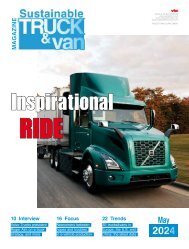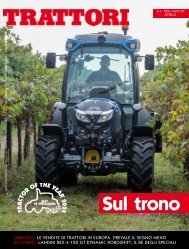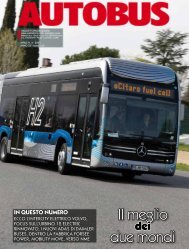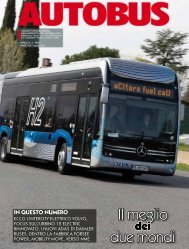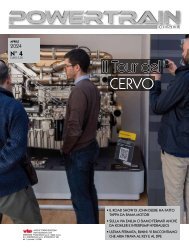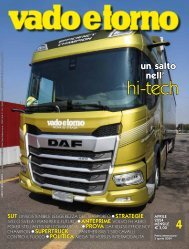2023_11_Sustainable Truck&Van
You also want an ePaper? Increase the reach of your titles
YUMPU automatically turns print PDFs into web optimized ePapers that Google loves.
AT A GLANCE<br />
THE FIRST IVECO-BRANDED ZERO EMISSION TRUCKS<br />
Every end is a new beginning<br />
THE NEW IVECO TRUCKS COME FROM THE END OF THE JV WITH NIKOLA<br />
MAN STARTED SELLING ITS VERY FIRST ELECTRIC TRUCK MODELS<br />
E-truck buyers awaited<br />
THE FIRST 200 UNITS SCHEDULED TO ROLL OUT NEXT YEAR<br />
Following the end of the joint venture with Nikola and the<br />
creation of the EVCO brand, IVECO introduced the heavy-duty<br />
battery-electric and fuel cell trucks marketed under its own brand.<br />
Of course, the trucks are a re-branding of the zero-emission models<br />
developed in the latest years in cooperation with Nikola.<br />
More into details, the IVECO HD BEV has a range of up to 500<br />
km. It features a total battery capacity of 738 kWh (9 packs) with<br />
charging power up to 350 kW, which enables hub-to-hub delivery<br />
missions, a wide range of regional applications, and even missions<br />
requiring extended mileage with charging opportunity during<br />
mandated driver stops. The Artic 4×2 configuration will be the first<br />
to enter the European market in the last quarter of <strong>2023</strong>.<br />
On the other hand, the IVECO HD FCEV boasts a range of up to 800<br />
km. With a fast-refuelling time of under 20 minutes, it is conceived<br />
for the long-haul mission in heavy commercial transportation. It<br />
can accommodate 70 kg of H2 usable energy at 700-bar pressure.<br />
According to the plans previously made public by IVECO, the first<br />
units of the IVECO-branded FCEVs will be delivered by the end of<br />
<strong>2023</strong>, namely in France, Switzerland and Germany, as planned in<br />
the H2Haul European project co-financed by the Clean Hydrogen<br />
Partnership aimed at accelerating the deployment of hydrogen<br />
solutions in the commercial transport industry and enabling the<br />
large-scale fuel cell truck market in the coming years. The IVECO<br />
HD BEV and FCEV feature an electric axle co-designed and<br />
produced by FPT Industrial, IVECO’s sister brand within Iveco<br />
Group specialized in powertrain. Fuel cell technology and key<br />
components are manufactured by Bosch.<br />
8<br />
E-VANS TOGETHER<br />
Two major groups (actually, three) join forces for<br />
electric vans of the future. Volvo and Renault,<br />
with the addition of French logistics group<br />
CMA CGM, today announced plans to form<br />
a new entity with the aim to design a shared<br />
architecture that will be the basis for future<br />
electric vans.<br />
The new company, which will be based in<br />
France, is expected to be launched in 2024, with<br />
production scheduled to start in 2026, according<br />
to the partners’ plans. The vehicles will be built<br />
on “on a new fully electric LCV skateboard<br />
platform that will offer high modularity for different<br />
body types at low cost and breakthrough on<br />
safety requirements”.<br />
Dragged into court<br />
British e-truck manufacturer Tevva is about to file a<br />
lawsuit against ElectraMeccanica (EMV), following<br />
the missed merger agreement between the two<br />
companies, which had been announced at the end<br />
of August, this year. In October, e-mobility specialist<br />
ElectraMeccanica announced the intention to step<br />
back. This was the beginning of quite a harsh<br />
communication battle, which will end in court.<br />
“The Tevva team was deeply disappointed by this<br />
abrupt decision and had no opportunity to respond<br />
to ElectraMeccanica’s claims before they went<br />
public”, stated the British manufacturer of zero<br />
emission trucks.<br />
At the same<br />
time, the lawsuit<br />
is not supposed<br />
to change the<br />
company’s<br />
operations and<br />
targets, at the<br />
moment.<br />
At the end of October, MAN Truck & Bus has officially launched<br />
sales of the eTruck, the first heavy-duty electric truck in the Lion’s<br />
history. According to the manufacturer’s statement, at least 600<br />
order inquiries have already been received, with the first 200 units<br />
scheduled to roll out to selected customers as early as 2024.<br />
With the eMobility Center, MAN laid the foundation for the<br />
development of the new MAN eTGX and MAN eTGS highvolume<br />
electric trucks at its Munich plant around two years ago<br />
and invested heavily in preparations for mixed production of diesel<br />
and electric trucks. 50 prototypes have since been built, and around<br />
4,000 employees from production and sales have been trained for<br />
the switch to electric mobility. At MAN’s Nuremberg site, MAN is<br />
investing around €100 million in setting up battery production.<br />
Developed by MAN specifically for use in commercial vehicles,<br />
batteries will be mass-produced at the Nuremberg plant from 2025.<br />
With their NMC cell chemistry and specially developed temperature<br />
management, the battery packs offer high energy density with a<br />
compact design, long service life and fast charging – even with low<br />
residual battery charge and low outside temperatures.<br />
Focus on hydrogen<br />
SUSTAINABLE MOBILITY WITH NO BARRIERS<br />
Tackling the big issue of sustainable<br />
mobility must contemplate a distinct<br />
change in mindset. Perhaps the<br />
main message we take home after<br />
participating in the second edition of<br />
the Global Mobility Call in Madrid is as<br />
much intangible as it is perspective.<br />
The Spanish exhibition, born on the<br />
initiative of Smobhub, an aggregator<br />
of companies, and actors of<br />
tomorrow’s mobility, and with the active<br />
collaboration of Ifema Madrid, is in fact<br />
an attempt to “bring together under<br />
one roof all the key stakeholders and<br />
actors in the ecosystem of sustainable<br />
mobility,” as Juan José Lillo, co-founder<br />
of Smobhub, creator and curator of<br />
the event, told us. Although focused<br />
on the Spanish market, Global Mobility<br />
Via the HYLA brand, Nikola has officially launched its<br />
hydrogen fuel cell truck with a dedicated ceremony<br />
in Coolidge, Arizona, where the manufacturer has<br />
its HQs. Nikola’s hydrogen fuel cell electric truck<br />
features a range of up to 500 miles (800 km) and an<br />
estimated fueling time as low as 20 minutes.<br />
According to the U.S.-based manufacturer, Nikola<br />
and its dealers have received 223 non-binding orders<br />
for its hydrogen fuel cell electric trucks from 23<br />
customers.<br />
Notable fleet operators such as J.B. Hunt, AJR<br />
Trucking, Biagi Bros. and TTSI, are among the<br />
growing list of customers committing to the future of<br />
sustainable trucking. It’s quite useful to remind that<br />
since the end of the joint venture with Iveco, Nikola’s<br />
truck business now focuses only on the North<br />
American market and mainly on hydrogen-powered<br />
trucks.<br />
Call is evidently trying to become<br />
more international, and with some<br />
appreciable results, gathering 500<br />
speakers, more than 100 exhibitors and<br />
over 8,000 professionals, 60 per cent of<br />
which in apex managerial position.<br />
The second edition of the<br />
Global Mobility Call was<br />
held in Madrid from 24<br />
to 26 October. The next<br />
edition is scheduled in<br />
November 2024.<br />
9


